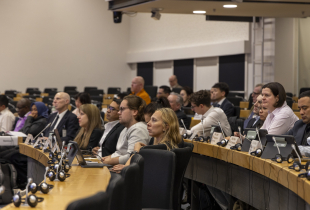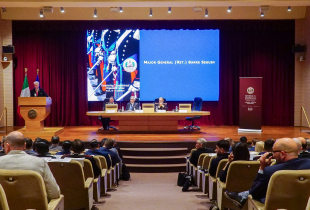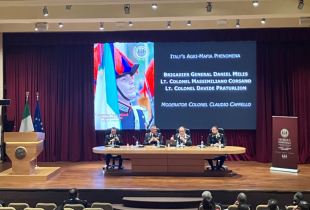
EUCOM’s Interagency Partnering Directorate Congratulates new 71 Marshall Center Alumni, First from Japan, Fiji
By Christine June
Public Affairs Office
George C. Marshall European Center for Security Studies
GARMISCH-PARTENKIRCHEN, Germany (April 24, 2015) – Michael Ryan, director, of the U.S. European Command’s Interagency Partnering Directorate, gave closing remarks April 24 at the graduation of the Countering Narcotics and Illicit Trafficking resident program at the George C. Marshall European Center for Security Studies here.
This year’s CNIT had 71 participants from 51 countries, including the first alumni from Japan and the Republic of Fiji.
Marshall Center’s CNIT is a two-and-a-half week resident program that focuses on 21st century national security threats as a result of illicit trafficking and other criminal activities. This resident program started April 9 and ended April 24.
"This year marks CNIT's progression to a global program, as we have participants coming in from all across the globe," said Professor Steve Monaco, the CNIT program director, who has 21 years experience as a special agent with the U.S. Drug Enforcement Administration and regional law enforcement advisor for the United Nations Office on Drugs and Crime.
"This is significant in that for the first time we will be hearing experiences and lessons learned from nations that we were not able to before," Monaco said.
As the Director, Ryan exercises responsibilities for integrating interagency, academia, nongovernmental, international organizations and private sector partners to better execute EUCOM’s mission to sustain strategic partnerships and support enduring peace and stability in Europe and Eurasia through a “Whole of Society” approach.
Ryan joined the Senior Executive Service of the Department of Defense in 2007 following a 25-year career in the U.S. Air Force, having retired as a Colonel. He was commissioned in 1982 from the U.S. Air Force Academy. He is a distinguished graduate of the Joint Military Intelligence College, was a National Defense Fellow with Congress, and attended the Collège interarmèe de défense in Paris.
His assignments include flying duties as an instructor pilot, flight commander, Red Flag mission commander, and assistant director of operations in the A-10A. His staff assignments include the Command Action Group in Air Education and Training Command and a tour in the Office of the Secretary of Defense.
He has taught extensively in the United States and Europe, including as a Department Director at the NATO School. Prior to assuming his previous position, he also served as the Military Advisor to the Secretary of Defense Representative, Europe at the US Mission to NATO.
Marshall Center’s CNIT course design included guest lecturers from national and international law enforcement and security organizations, course seminar activities discussing the range of government countermeasures to combat criminal activity, and strategy development exercises that focus on best practices and international approaches to combating these growing threats against national security.
This year’s CNIT participants hail from: Afghanistan; Albania; Algeria; Argentina; Armenia; Australia; Azerbaijan; Bahamas; Belize; Bosnia and Herzegovina; Bulgaria; Colombia; Czech Republic; Dominican Republic; Egypt; El Salvador; Fiji Islands; Georgia; Greece; Guatemala; Hungary; India; Indonesia; Japan; Jordan; Kazakhstan; Kenya; Kosovo; Malaysia; Maldives; Mauritania; Mexico; Moldova; Mongolia; Montenegro; Morocco; New Zealand; Nigeria; Oman; Peru; Philippines; Romania; Serbia; Slovenia; South Africa: Tanzania; Thailand; Turkey; Ukraine, United States; and, Uzbekistan.
This year’s CNIT course has a good mixture of participants who work at defense, interior and justice ministries, and law enforcement and other government agencies.
The course is designed for government officials and practitioners who are engaged in policy development, law enforcement, intelligence, and interdiction activities aimed at countering illicit narcotics trafficking, terrorist involvement in criminal activity, and the associated elements of transnational crime and corruption. It examines the major methods by which transnational criminal and terrorist organizations engage in illegal narcotics trafficking and other criminal activities for profit.
The mission of the Marshall Center, as a vital instrument of German-American cooperation, is to create a more stable security environment by advancing democratic institutions and relationships; promoting active, peaceful, whole-of-government approaches to address transnational and regional security challenges; and creating and enhancing enduring partnerships worldwide.
The Marshall Center offers eight resident programs that examine complex transnational, regional and international security issues: Program on Terrorism and Security Studies; Program on Applied Security Studies; Program on Security Sector Capacity Building; Seminar on Regional Security; Seminar on Transnational Civil Security; CNIT; Program on Cyber Security Studies; and, Senior Executive Seminar.


